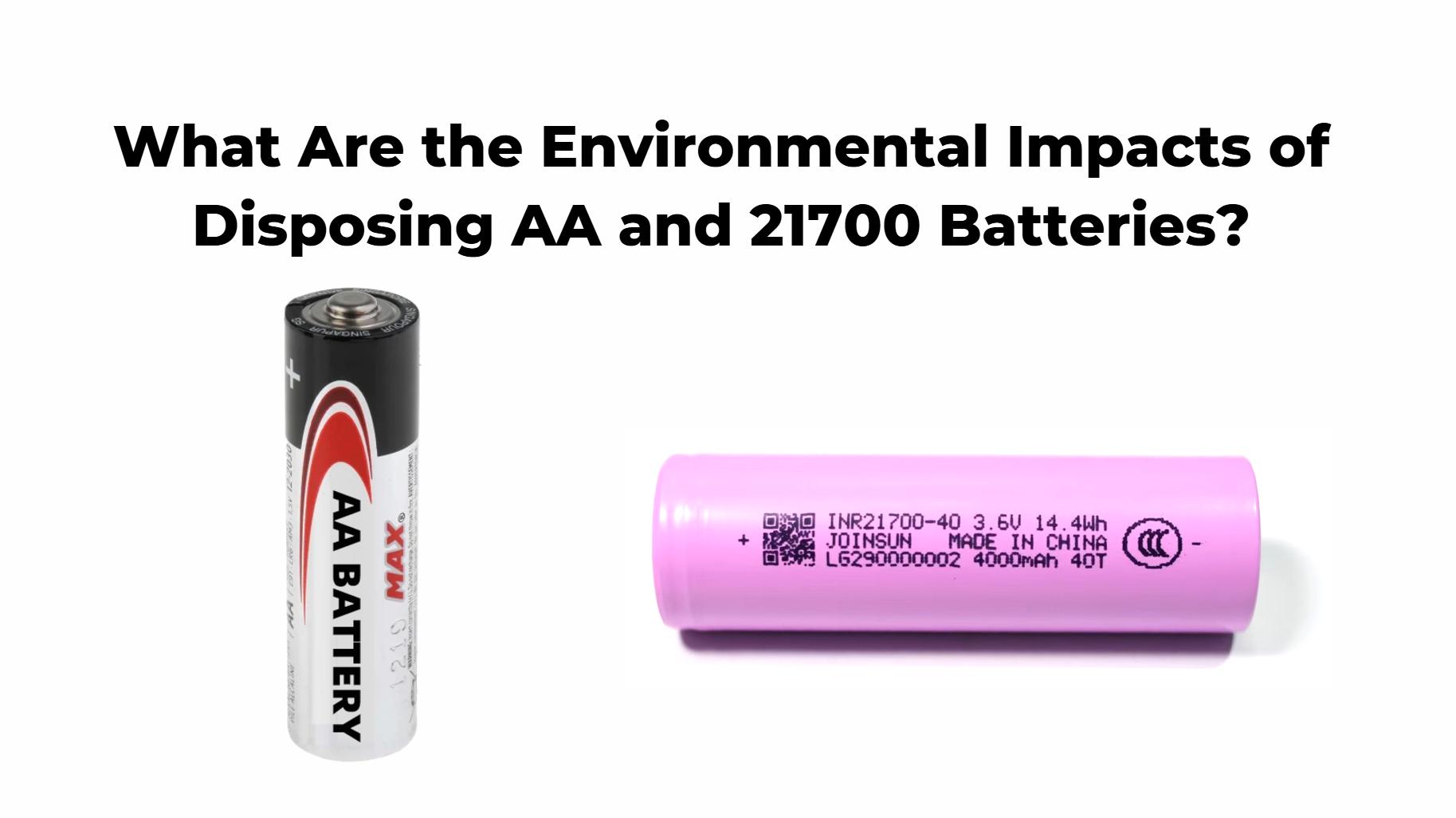Improper disposal of AA and 21700 batteries can have severe environmental impacts, including soil contamination, water pollution, and harm to wildlife. These batteries contain hazardous materials that can leach into the environment, posing risks to ecosystems and human health if not disposed of correctly.
Introduction to Battery Disposal and Its Environmental Impact
Batteries are essential for powering everyday devices, from remote controls to electric vehicles. However, when these batteries reach the end of their life cycle, improper disposal can lead to significant environmental challenges. Understanding the composition of AA and 21700 batteries is crucial for recognizing their potential impacts.
Composition of AA and 21700 Batteries
AA batteries typically contain alkaline or lithium-ion chemistry, while 21700 batteries are primarily lithium-ion. The key components include:
- Alkaline Batteries: Composed of zinc, manganese dioxide, and potassium hydroxide.
- Lithium-Ion Batteries: Contain lithium cobalt oxide or lithium iron phosphate, along with other metals like nickel and manganese.
| Battery Type | Composition | Common Uses |
|---|---|---|
| AA Alkaline | Zinc, Manganese Dioxide | Remote controls, toys |
| 21700 Lithium-Ion | Lithium Cobalt Oxide, Nickel | Electric vehicles, laptops |
Environmental Impacts of Improper Disposal
Soil Contamination
When batteries are disposed of in landfills, they can corrode over time, releasing toxic metals such as lead, cadmium, and mercury into the soil. This contamination can alter soil composition, reduce fertility, and harm microorganisms essential for healthy ecosystems.
Water Pollution
Toxic leachate from batteries can seep into groundwater and surface water sources. This pollution poses risks not only to aquatic ecosystems but also to human health as contaminated water may enter drinking supplies.
| Pollution Type | Source | Potential Impact |
|---|---|---|
| Soil Pollution | Corroded battery casings | Reduced fertility, crop damage |
| Water Pollution | Leachate from landfills | Contaminated drinking water |
Air Pollution
Improper incineration of batteries can release harmful fumes and particulate matter into the atmosphere. These emissions contribute to air quality degradation, which can cause respiratory problems in humans and animals.
Effects on Wildlife and Ecosystems
Heavy metals from battery waste can accumulate in the food chain, affecting plants, insects, birds, and larger predators. This bioaccumulation disrupts ecosystems and can lead to declines in sensitive species populations.
Human Health Risks Associated with Battery Waste
The hazardous materials found in batteries pose significant health risks:
- Lead Exposure: Can cause neurological damage, particularly in children.
- Cadmium: Linked to kidney damage and bone fragility.
- Mercury: Can affect brain development in fetuses and young children.
Regular exposure to these toxic elements through contaminated soil or water can lead to serious health issues over time.
Best Practices for Battery Disposal and Recycling
To mitigate environmental impacts, it is crucial to follow best practices for battery disposal:
- Use Designated Recycling Centers: Many communities have recycling programs specifically for batteries.
- Participate in Take-Back Programs: Many retailers offer take-back programs where consumers can return used batteries.
- Educate Yourself: Understanding local regulations regarding battery disposal can help ensure compliance.
| Best Practice | Description |
|---|---|
| Recycling Centers | Facilities equipped to handle hazardous materials |
| Take-Back Programs | Retailer programs for returning used batteries |
| Education | Awareness campaigns about proper disposal |
Current Regulations and Challenges in Battery Disposal
Many countries have regulations governing battery disposal; however, enforcement varies widely. Inadequate infrastructure for recycling leads to many batteries ending up in landfills instead of being recycled properly. Extended Producer Responsibility (EPR) policies are being discussed globally to hold manufacturers accountable for end-of-life battery management.
Latest News on Battery Recycling Initiatives
Recent initiatives focus on improving battery recycling rates through better public awareness campaigns and enhanced recycling technologies. Companies are investing in processes that recover valuable materials from spent batteries, reducing the need for new raw materials while minimizing environmental impact.
Expert Comment
“Improper disposal of batteries is a significant environmental issue that requires immediate attention,” says Dr. Lisa Greenfield, an environmental scientist specializing in waste management. “By adopting better recycling practices and supporting legislation aimed at responsible battery disposal, we can mitigate these risks effectively.”
Frequently Asked Questions
Q: What happens if I throw batteries in the regular trash?
A: Throwing batteries in the trash can lead to soil and water contamination as they corrode in landfills.Q: Can I recycle all types of batteries?
A: Most types of batteries can be recycled; however, specific recycling programs may be needed for certain types like lithium-ion.Q: How do I find a recycling center near me?
A: Check local government websites or use online resources that list designated recycling centers for hazardous waste.Q: What should I do with leaking or damaged batteries?
A: Keep them separate from other batteries and contact a hazardous waste facility for special handling instructions.
Know more:
How do the costs of AA and 21700 batteries compare over time
What are the environmental impacts of disposing AA and 21700 batteries
Which devices are best suited for 21700 batteries
How does the energy density of 21700 batteries affect their performance
Are there any compatibility issues when using 21700 batteries in devices designed for AA batteries



